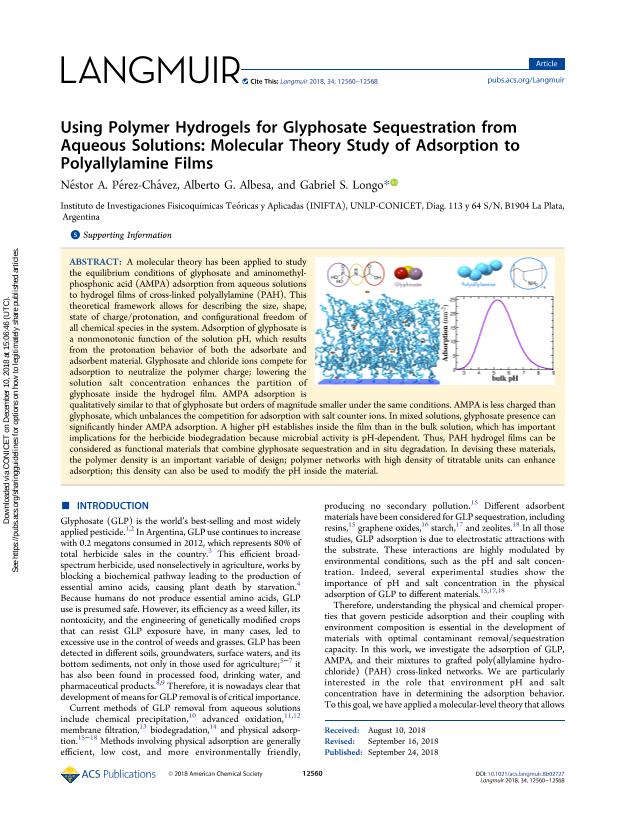Artículo
Using Polymer Hydrogels for Glyphosate Sequestration from Aqueous Solutions: Molecular Theory Study of Adsorption to Polyallylamine Films
Fecha de publicación:
10/2018
Editorial:
American Chemical Society
Revista:
Langmuir
ISSN:
0743-7463
Idioma:
Inglés
Tipo de recurso:
Artículo publicado
Clasificación temática:
Resumen
A molecular theory has been applied to study the equilibrium conditions of glyphosate and aminomethylphosphonic acid (AMPA) adsorption from aqueous solutions to hydrogel films of cross-linked polyallylamine (PAH). This theoretical framework allows for describing the size, shape, state of charge/protonation, and configurational freedom of all chemical species in the system. Adsorption of glyphosate is a nonmonotonic function of the solution pH, which results from the protonation behavior of both the adsorbate and adsorbent material. Glyphosate and chloride ions compete for adsorption to neutralize the polymer charge; lowering the solution salt concentration enhances the partition of glyphosate inside the hydrogel film. AMPA adsorption is qualitatively similar to that of glyphosate but orders of magnitude smaller under the same conditions. AMPA is less charged than glyphosate, which unbalances the competition for adsorption with salt counter ions. In mixed solutions, glyphosate presence can significantly hinder AMPA adsorption. A higher pH establishes inside the film than in the bulk solution, which has important implications for the herbicide biodegradation because microbial activity is pH-dependent. Thus, PAH hydrogel films can be considered as functional materials that combine glyphosate sequestration and in situ degradation. In devising these materials, the polymer density is an important variable of design; polymer networks with high density of titratable units can enhance adsorption; this density can also be used to modify the pH inside the material.
Archivos asociados
Licencia
Identificadores
Colecciones
Articulos(INIFTA)
Articulos de INST.DE INV.FISICOQUIMICAS TEORICAS Y APLIC.
Articulos de INST.DE INV.FISICOQUIMICAS TEORICAS Y APLIC.
Citación
Pérez Chávez, Néstor Ariel; Albesa, Alberto Gustavo; Longo, Gabriel Sebastian; Using Polymer Hydrogels for Glyphosate Sequestration from Aqueous Solutions: Molecular Theory Study of Adsorption to Polyallylamine Films; American Chemical Society; Langmuir; 34; 42; 10-2018; 12560-12568
Compartir
Altmétricas




